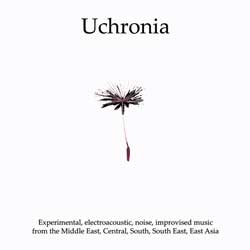Published by Alessandro Violante on May 17, 2018
 Approximately two years after the release of Not your world music: Noise in South East Asia, which has made possible for Cedrik Fermont and Dimitri Della Faille to win one Golden Nica during the last Ars Electronica festival yearly held in September in Linz, the versatile musician, writer, traveller and curious person Fermont, especially known for being active with Axiome (together with Olivier Moreau / Imminent) and C-drik, has made a majestic triple CD box. It includes an essay, released in only 1000 copies, which should be considered a huge music appendix to the work made some time ago with the anthropologist Della Faille.
Approximately two years after the release of Not your world music: Noise in South East Asia, which has made possible for Cedrik Fermont and Dimitri Della Faille to win one Golden Nica during the last Ars Electronica festival yearly held in September in Linz, the versatile musician, writer, traveller and curious person Fermont, especially known for being active with Axiome (together with Olivier Moreau / Imminent) and C-drik, has made a majestic triple CD box. It includes an essay, released in only 1000 copies, which should be considered a huge music appendix to the work made some time ago with the anthropologist Della Faille.
Released by his own label Syrphe, Uchronia is a majestic sonic document (and not only) focused on experimental, electroacoustic, noise, improvised music created in the countries of the Middle East, Central, South, South East, East Asia. The title of this huge result of his neverending research, comes from a term coined in 1876 by the writer Charles Renouvier which means an “hypothetical or fictional time period”.
49 songs made by 49 artists making music in 32 different countries make a lot of material, and it’s hard to keep high the attention of the listener for the whole length of this enormous work. But it’s quite stimulating, as their music cover a wide range of genres and approaches, and it’s difficult to get bored when immersed into the caleidoscopic universe presented by Fermont.
Uchronia has also a relevant social importance because of the chance for the European listener to discover cultures he doesn’t know abour, through the music contained in these CDs. Fermont isn’t the only one who has presented this kind of music, also the passionated Italian music fan Raffaele Pezzella did (and he still does) something similar with Unexplained Sounds, but they do it in different ways.
That of Fermont is the result of his long and several travels through these countries, talking with their people, living with them. It’s not only a music research, but also a social and anthropologic one. Moving throughout a complex and kaleidoscopic sonic jungle, such as that of Uchronia, it’s difficult to pick up songs which are more beautiful and interesting than others, as each of them has something to tell us, something that goes beyond music itself.
Let’s think about Stephanie Merchak‘s song, sounding as if it was composed by 2001: A Space Odissey’ HAL-9000, a sort of alien communication. It sounds as if it was by a European musician, but it in a totally different context, and that’s pretty interesting from a sociologic point of view. The same consideration could be made for other songs. However, if the true peak of the work has to be identified, it could be found on two songs, Fag Boy Jesus by the activist Gülce Özen Gürkan and Twitter by Teenage Granny.
The first song is a spoken word sung by the artist, a sort of sonic document recorded before committing an imaginary suicidal act. The artist, pours out herself talking about gender problems, criticizing religion, expressing her condition of unhappiness, of not feeling good into her daily world. Hers is a harsh disapproval towards society. This declaration is put inside a manipulated sonic flow, in which also her voice is altered and manipulated, but what is truly important here is the message she wants to give us.
Twitter wants to focus our attention on the weight social network has progressively gained in our lives, where we are always more conditioned by their mechanisms. We live for likes, we’re happier when they put them on the content we share, we prefer to tweet more than to talk with others. This should make us think about the direction our world is going to. Several artists have analyzed the problem, but Twitter does it in a particularly good way, also here through an inspired, avantgarde-like, spoken word.
Of course there’s a lot of space given to noise songs, and undoubtedly some of them are very valid, but there’s not so much to add to what already said by Fermont and Della Faille themselves as well as by Riar Rizaldi, the director of the movie Bising: Noise and experimental music in Indonesia in 2014. What’s really interesting, and what clearly emerges from this box set, is how in determined geographical area, music boundaries are less important than in European and American music. Clear boundaries among noise, music conceived for exhibitions, electronic, music made with primitive instruments and sound art don’t exist. Antiquity and modernity, hegemonic and pop culture, instrumental and electronic music are perfectly meld together. One example of this melting pot, among the others, is that of Sharif Sehnauoi.
Uchronia is the result of a complex research work, an excellent product, sometimes not so easy to enjoy, but able to give more than something to the listener and to widen his mind, and that’s what music should do: Give something new to the listener.
Label: Syrhphe
Rating: 8

